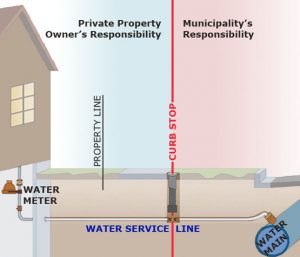City offers lead service replacement loans
By Scott Bellile
New London homeowners will have the option of borrowing money from the city to replace lead pipe water service lines over the next couple of years.
The New London City Council on Jan. 9 authorized setting aside $250,000 of retained earnings from the municipal wastewater treatment plant fund to offer loans to property owners.
The council approved the measure 9-0. Fifth District Alderman Dennis Herter did not attend the meeting.

In New London, 355 homeowners whose houses date back to the days of lead piping will be required to replace their lead water and/or clay sewer lines on their private property. They will foot the bill to replace the service line replaced between the curb stop and their home and arrange the work on their own time.
The loans will have a 1 percent interest rate and a repayment deadline of 10 years, New London Finance Director Judy Radke said at the Jan. 3 meeting of the New London Finance and Personnel Committee, where the proposal was recommended to the city council.
Similar to the city, New London Utilities also designated $250,000 to lend to property owners who need to replace clay sewer lines, according to Steve Thompson, the utilities’ general manager. That loan will also have a 1 percent interest rate at 10 years.
The 10-year loans aim to ease the impacted property owners’ financial burdens, Thompson said. He estimates the average homeowner will pay $3,000 to $5,000 to replace their water and sewer laterals.
The lead pipe water service line loan was conceived after the city was awarded but ultimately declined a $150,000 Safe Drinking Water Loan Program grant to offset homeowners’ costs to replace lead lines.
The Wisconsin Department of Natural Resources awarded the grant to New London and 29 other municipalities in late 2017.
New London turned down the grant because it was subject to federal requirements that, in the end, could have eroded $135,000 of the grant’s $150,000, leaving New London with $15,000 to distribute among 355 homes. That would average out to $42 in financial assistance per lead-line household.
The additional grant-associated costs that the city could have incurred by using the grant included:
• Paying a federal wage rate to contractors replacing the lines ($80,000)
• Conducting detailed archaeological reviews on sites of interest ($49,000)
• Conducting an endangered species survey ($4,000)
• Paying utility personnel to manage and coordinate the project ($2,000)
Those costs are according to an October 2017 memo addressed to Thompson from Aecom Project Engineer Angel Gebeau, whom Thompson consulted to learn if accepting the grant would benefit the city.
“These costs are unique to New London Utilities verses (sic) other utilities since many homes are in archaeologically significant areas and would require additional scrutiny,” Gebeau stated. “While many other utilities may see great benefits in using the program, those benefits are muted at New London because of other ancillary costs.”
Of the 355 lead service lines in New London, Thompson said the city has so far replaced around 240 lead pipes that are found in the public property portion between the street and the curb stop.
The city plans to replace the rest over the next couple of years, starting with those beneath Division Street in 2018 when the road is reconstructed.
He said there are an additional 50 to 80 galvanized steel service lines in the city, which could have been connected to lead plumbing or contain traces of lead.
At the city council meeting on Jan. 9, New London Mayor Gary Henke said that the 1 percent interest rate over 10 years that the city will offer residents is “very low.” He added it will be more affordable for residents than an 8 percent interest rate over five years, which is permissible under city ordinance.
Third District Alderman Mike Barrington commented that the purpose of requiring home owners to replace both water and sewer lines now is to ensure that those streets are only torn up once.
Homeowners with lead services will receive invitations to a public forum to be held sometime this spring.
